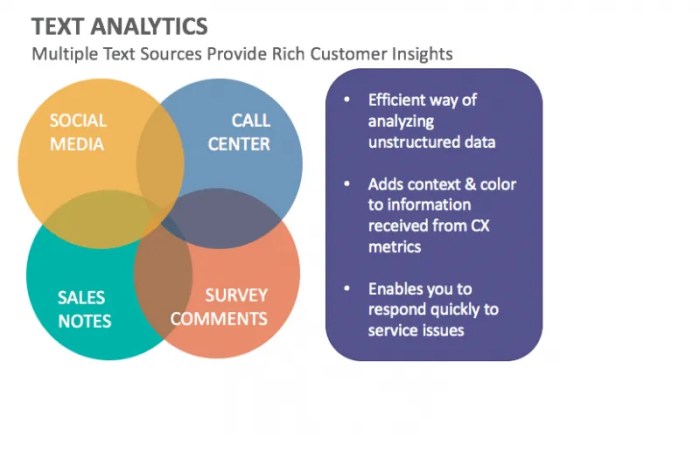AI-powered customer feedback analysis is revolutionizing how businesses understand and respond to their customers. By leveraging the power of artificial intelligence, companies can analyze vast amounts of customer data, gleaning valuable insights into customer sentiment, preferences, and pain points.
This technology goes beyond simple sentiment analysis, delving deeper into the complexities of customer feedback. It can identify key themes and topics, predict future trends, and even personalize customer experiences. This allows businesses to make data-driven decisions that enhance customer satisfaction and drive business growth.
Challenges and Considerations

While AI-powered customer feedback analysis offers numerous benefits, it’s crucial to acknowledge potential challenges and considerations. Successfully implementing and leveraging AI for feedback analysis requires careful planning, addressing ethical concerns, and ensuring human oversight.
Data Quality and Ethical Considerations
The accuracy and reliability of AI-driven insights heavily depend on the quality of the data used to train the AI models. Biased or incomplete data can lead to inaccurate interpretations and potentially harmful decisions. It’s essential to ensure data integrity, address potential biases, and maintain data privacy throughout the process.
- Data Integrity:The accuracy of AI-generated insights is directly proportional to the quality of the data used to train the models. Inaccurate, incomplete, or inconsistent data can lead to biased and unreliable results. It’s crucial to establish robust data validation processes to ensure data integrity and minimize the risk of erroneous interpretations.
- Addressing Biases:AI models can inherit biases present in the training data, potentially leading to discriminatory or unfair outcomes. It’s essential to actively identify and mitigate biases in the data, using techniques like data augmentation, fairness-aware algorithms, and regular audits to ensure ethical and unbiased analysis.
- Data Privacy:Customer feedback often contains sensitive personal information. Implementing robust data privacy and security measures is crucial to protect customer data and comply with relevant regulations. This includes data anonymization, encryption, and access control mechanisms to safeguard sensitive information.
Human Oversight and Interpretation
While AI can efficiently process large volumes of data and identify patterns, it’s important to remember that AI is a tool, not a replacement for human judgment. Human oversight is crucial for interpreting AI-generated insights, ensuring context, and making informed decisions.
- Contextual Understanding:AI models often struggle to understand the nuances and context of human language, especially when dealing with subjective feedback. Human analysts are essential for interpreting AI-generated insights within the broader context of customer interactions and business objectives.
- Decision-Making:While AI can provide valuable insights, ultimately, human decision-makers are responsible for interpreting these insights and making informed decisions. This requires a thorough understanding of the AI’s limitations and the ability to critically evaluate the generated recommendations.
- Ethical Considerations:Human oversight is critical for ensuring ethical and responsible use of AI-powered feedback analysis. This includes evaluating the potential impact of AI-driven decisions on customers, employees, and the broader society, ensuring fairness, transparency, and accountability.
Future Trends in AI-Powered Customer Feedback Analysis

The field of AI-powered customer feedback analysis is rapidly evolving, with new technologies and approaches constantly emerging. This dynamic landscape presents exciting opportunities for businesses to gain deeper insights into customer sentiment and preferences, leading to improved customer experiences and enhanced business outcomes.
Advancements in Natural Language Processing (NLP)
The ability to understand and interpret human language is a crucial aspect of AI-powered customer feedback analysis. NLP advancements will play a significant role in enhancing the accuracy and depth of customer insights.
- Enhanced Sentiment Analysis:NLP models will become more sophisticated in identifying subtle nuances in customer feedback, going beyond simple positive, negative, or neutral classifications. They will be able to detect sarcasm, irony, and other complex expressions of sentiment, providing a more nuanced understanding of customer emotions.
- Contextual Understanding:Future NLP models will be able to understand the context of customer feedback, taking into account factors like product usage, purchase history, and demographics. This contextual awareness will enable businesses to tailor their responses and actions to specific customer needs and situations.
- Multi-Lingual Support:As businesses operate in increasingly global markets, NLP models will need to be able to analyze feedback in multiple languages. This will allow businesses to gather insights from a wider range of customers and ensure that no feedback is left unanalyzed.
Integration with Other AI Technologies
AI-powered customer feedback analysis will increasingly benefit from integration with other AI technologies, creating a more comprehensive and powerful analytical framework.
- Machine Learning (ML) and Deep Learning (DL):ML and DL algorithms will be used to identify patterns and trends in customer feedback, enabling businesses to predict customer behavior and proactively address potential issues. These algorithms can also be used to personalize customer experiences based on individual preferences and past interactions.
- Computer Vision:AI-powered image and video analysis can be used to analyze customer feedback captured through social media posts, product reviews, and other visual channels. This technology can help businesses understand customer reactions to product designs, packaging, and marketing materials.
- Speech Recognition:Speech recognition technology will enable businesses to analyze customer feedback captured through phone calls, voice assistants, and other audio channels. This will allow businesses to understand customer sentiment and preferences expressed verbally.
Personalized Customer Insights, AI-powered customer feedback analysis
AI-powered feedback analysis will enable businesses to provide highly personalized customer experiences by tailoring their interactions and offerings based on individual preferences and needs.
- Customer Segmentation:AI algorithms can be used to segment customers into groups based on their feedback, demographics, and other factors. This allows businesses to tailor their marketing campaigns, product recommendations, and customer service interactions to the specific needs of each segment.
- Predictive Analytics:AI can be used to predict customer churn, identify potential product issues, and anticipate future customer needs. This allows businesses to proactively address potential problems and enhance customer satisfaction.
- Real-Time Feedback Analysis:AI can be used to analyze customer feedback in real-time, allowing businesses to quickly identify and address customer issues before they escalate. This can significantly improve customer satisfaction and loyalty.
Impact on Customer Experience and Business Operations
The adoption of AI-powered customer feedback analysis will have a profound impact on both customer experience and business operations.
- Improved Customer Satisfaction:By understanding customer needs and preferences, businesses can provide more personalized and responsive service, leading to increased customer satisfaction and loyalty.
- Enhanced Product Development:AI-powered feedback analysis can help businesses identify areas for product improvement and innovation, leading to the development of products that better meet customer needs.
- Optimized Marketing Strategies:AI can help businesses target their marketing campaigns more effectively, leading to increased conversion rates and reduced marketing costs.
- Reduced Operational Costs:By automating tasks like sentiment analysis and feedback categorization, AI can help businesses reduce their operational costs and free up employees to focus on more strategic initiatives.
Final Thoughts: AI-powered Customer Feedback Analysis
AI-powered customer feedback analysis is no longer a futuristic concept; it’s a powerful tool readily available to businesses of all sizes. By embracing this technology, companies can unlock a wealth of customer insights, optimize their products and services, and build stronger relationships with their customers.
The future of customer feedback analysis is undoubtedly AI-driven, and businesses that leverage its potential will be well-positioned to thrive in the competitive landscape of today.
FAQ Corner
How does AI improve the speed and accuracy of customer feedback analysis?
AI algorithms can process and analyze large volumes of data much faster than humans, providing insights in real-time. They can also identify patterns and trends that humans might miss, leading to more accurate analysis.
What are some ethical considerations in AI-powered customer feedback analysis?
It’s crucial to ensure data privacy and security. Additionally, bias in AI algorithms can lead to unfair or discriminatory outcomes, so it’s important to address and mitigate these biases.
How can I implement AI-powered customer feedback analysis in my business?
There are various software solutions available that offer AI-powered customer feedback analysis capabilities. You can also work with AI consultants to tailor a solution to your specific needs.
